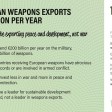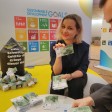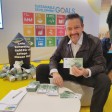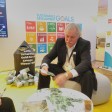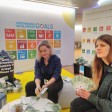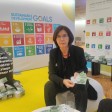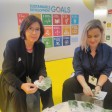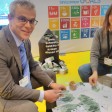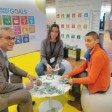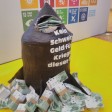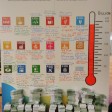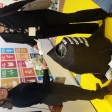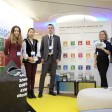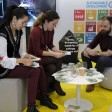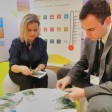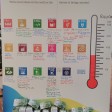Europe should stop exporting weapons and financing war, and should instead invest in peace, security and sustainable development, according to participants in three events in Basel organized by the Basel Peace Office on Jan 14-15.
‘European countries collectively spend €220 billion on the military and export €27 billion of weapons annually, many of these weapons going to regimes with horrific human rights records or which are in armed conflict. In comparison, Europe invests only €140million (0.6% of the military budget) on the Organisation for Security and Cooperation in Europe (OSCE), which brings Europe, North America and Russia together to manage conflicts, forge peace and build common security,’ says Christine Muttonen (Austria), former President of the OSCE Parliamentary Assembly.
‘The erosion of the Intermediate Nuclear Forces Treaty and continued conflicts between Europe and Russia over Ukraine and Syria make this even more important. For our security and survival, we need to invest more in peace and less in militarism,’ says Ms Muttonen, who spoke at a public event on January 14: Investing in peace and sustainability: Political and financial policies to protect future generations from climate change and nuclear weapons, and at Nuclear Disarmament and Divestment, a regional meeting of European parliamentarians and city leaders on Jan 15.
‘The magnitude of this military spending is not understood by the public, nor the amount of good that would occur if just a portion of this money was reallocated to peace and sustainable development,’ says Prof (em) Andreas Nidecker MD (Switzerland), President of the Basel Peace Office. ‘As such, yesterday we counted out €27 billion – the amount of annual European arms exports – in 27,000 notes each of €1 million value, and ‘reallocated’ this to climate protection and the other sustainable development goals.’
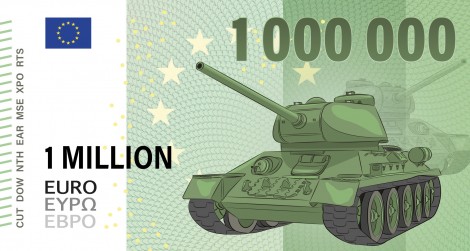
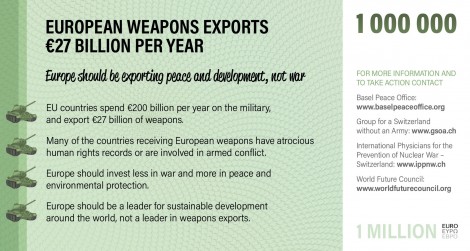
The counting action took place during the Basel Peace Forum, an annual event organized by swisspeace which brings around 200 leaders of business, diplomacy, academia and civil society from around the world to Basel to generate new ideas for peace, conflict prevention and conflict transformation. A key theme for the 2019 Forum was Impact Investing. Other topics include Artificial Intelligence and Digitalization, Architecture and Urban Planning, Health and Migration as well as Risks in the Extractive Industries.
The Mayors for Peace network, to which more than 7,000 cities and towns belong, is a worldwide movement for peace that is a powerful voice against war and environmental destruction,’ says Thomas Hermann, Deputy Mayor of Hannover, a Mayors for Peace Executive City. ‘Now more than ever, when peace-making treaties that respond to nuclear armament are being called into question, when we face the threat of new arms escalation in Europe, and when the consequences of climate change are displacing people in increasing numbers, we must speak out more forcefully once again.’
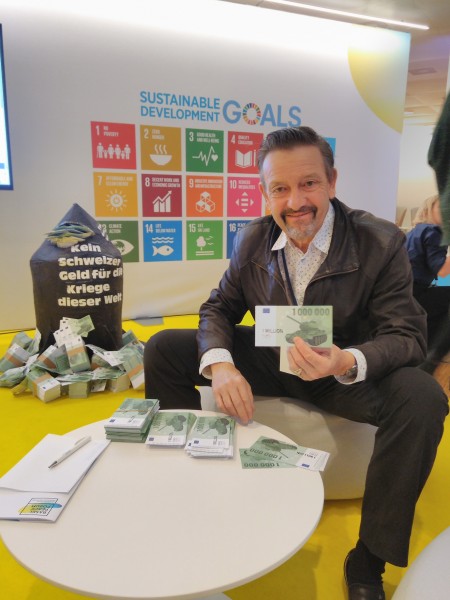
Dr Andi Nidecker, President of the Basel Peace Office, counting weapons exports money and reallocating it to SDGs
‘The issue of nuclear disarmament is again on the European political agenda as nuclear threats have returned, the arms race between Russia and the USA has resumed and nuclear arms control agreements like the Intermediate Nuclear Forces (INF) Treaty are eroding,’ says Alyn Ware (Czech Republic), Global Coordinator of Parliamentarians for Nuclear Nonproliferation and Disarmament (PNND).
‘As such, at our meeting on January 15, we paid particular attention to what mayors, city councils and parliamentarians can do to support nuclear-risk reduction policies such as no-first-use and de-alerting, and in reducing nuclear weapons budgets and investments. And we adopted the Basel Appeal on Disarmament and Sustainable Security (also available in German, French, Spanish and Russian), which on January 29, 2019 was sent to leaders of Russia, USA and Europe supporting the INF and other arms control treaties, and calling for the phase out of nuclear deterrence in favour of more effective common security.’
‘Legislators at national, regional and city levels have key roles to play in adopting policies to prevent war, support disarmament – especially nuclear disarmament – and promote sustainable development,’ says Thore Vestby (Norway), Vice-President of Mayors for Peace. ‘The Norwegian parliament, for example, moved the government pension fund a decade ago to divest from corporations producing nuclear weapons or operating in other ways in contravention to the UN Global Compact on investments and responsible business practice. Since then a number of other governments and banks have followed suit. With the recent adoption of the Treaty on the Prohibition of Nuclear Weapons, divestment from nuclear weapons should become the norm, not the exception.’
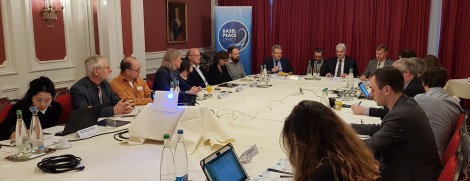
Lukas Ott, President's Department Basel-Stadt Kanton (city) speaking at the Euorpean regional meeting of PNND and Mayors for Peace
'Europeans need to invest more in climate protection and sustainable development in order to ensure we have a peaceful and habitable planet for future generations,’ says Molly Scott Cato (UK), Member of the European Parliament for South West England and Gibraltar. ‘We are headed towards a climate catastrophe – and additional climate-induced conflicts - unless we shift financial incentives from fossil fuels and militarism, to sustainable investment. Governments, cities, pension funds, universities, banks and other investors should move away from voluntary divestment to well and truly end their investments in fossil fuels and the arms industry. Instead they should join the growing trend towards investments in renewable energies, green industries, healthy ecosystems and other sectors which support sustainable development.'
‘Swiss pension funds are asking all stock listed companies for a planned reduction of carbon emissions, says Rudolf Rechsteiner (Switzerland), president of Ethos Foundation. Wind and solar cover 6 percent of world power demand now, following an exponential growth path due to their low cost. ‘A 100% renewable energy future is within reach and the change is disruptive. Investors should promote these policies in cooperation with governments; divestment from coal, oil, gas and nuclear perfectly makes sense: the energy sector was at the bottom of the S&P 500 in 2018, and close to last place in 2017.’
‘Young people across Europe are rising. We are getting increasingly active in socially responsible and sustainable investment campaigns, and especially in ending investments in fossil fuels and war,’ says Luisa Neubauer (Germany), Youth Climate activist from Fossil Free Germany. ‘The growing number of universities committing to divestment adds a strong normative aspect to the campaign that will hopefully also influence governments and other investors.’
‘Investment and trade can be a positive force for peace between nations if undertaken according to socially responsible principles’, concluded Dr Nidecker. ‘I am proud that Basel Kanton is working to implement such policies here, and to promote such policies in Europe and globally.’


